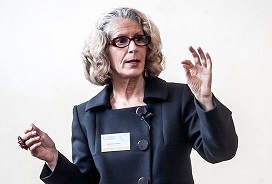Building a Culture of Philanthropy
 Nothing works without good culture! There’s been a fruitful bounty of research and writing about organizational culture, and it’s safe to conclude that culture is critically important for nonprofits too.
Nothing works without good culture! There’s been a fruitful bounty of research and writing about organizational culture, and it’s safe to conclude that culture is critically important for nonprofits too.
AFP recently had a chance to chat with Simone Joyaux, ACFRE, Adv Dip, about philanthropic culture, what it means and why it works. Joyaux shares tips on top cultural elements essential for an effective organization. She also covered these subjects in much more detail during her recent webinar, Building a Culture of Philanthropy. If you missed the live webinar event on June 20, you can still sign up and listen to the archived event.
Q. What is the key takeaway from this webinar?
A. Organizational culture matters (pretty much) more than anything else.
Q. How would you define philanthropic culture? What’s the difference between philanthropic culture vs. fundraising culture?
A. You must start by defining organizational culture.
Organizational Culture is the personality of an organization—how your members interact and behave. It’s the unwritten rules. Organizational culture is an attitude. For example, the organization has the appropriate attitude around philanthropy.
Philanthropic Culture is merely a subset of organizational culture. We believe in philanthropy – voluntary action for the common good, the love of human kind. Saying thank you to donors. Respecting everyone. Making sure no donor, neither one is more special.
Fundraising Culture focuses on money. We need money now. Nothing matters but getting money.
Q. Tell us about strategy, and the meaning of “culture eats strategy for breakfast”.
A. It’s a concept from business guru Peter Drucker. Strategy is useless if you don’t have a positive culture in your organization. A negative and flawed culture can ruin the best strategy.
Q. What are the top cultural elements essential for an effective organization?
A. Have you ever worked in a toxic culture? Here are a few cultural elements essential for an effective organization:
- You can’t be in departmental silos. You must connect with each other as individuals
- Honesty, the ability to speak candidly with each other
- Self-aware, and the ability to criticize one’s own self and others. Engage in critical self-reflection and other reflection. Challenge your own assumption. Educate yourself and read about organizational culture. Outline different steps, finding allies.
- Create a safe work environment.
Q. Has there been much research on philanthropic culture?
A. There’s not been much research that proves a philanthropic culture raises more money. On the other hand, there has been lots of academic research regarding the criticality of organizational culture. Areas of study and effective business theory include:
- Systems thinking
- Learning organization business strategy
- Teams
- Communications
- Leadership
I encourage organizations to learn more about organizational culture by distinguishing between a culture of fundraising and a culture of philanthropy, and engaging your staff in conversations about organizational culture and philanthropic culture. Make sure to include the board, too!
Q. How did you get involved in philanthropy? What do you enjoy most?
A. At 9 years old, while living in France, I resolved to be a French and English teacher at a middle or high school. I planned my whole life for a teaching career. But I could never find a teaching job. So, I had to do something else. I saw a job posting for an executive director of small arts organization in my hometown, Lansing, Michigan. I didn't know a think about such a job! But, I was dumb enough and smart enough to apply. And they were dumb enough and smart enough to hire me. I feel in love with the nonprofit sector and arts organizations. In 1988, I became the chief development officer at Trinity Repertory Company in Rhode Island. And on January 15, 2018, I started my 31st year as a full-time consultant.
My areas of expertise are fundraising, strategic planning and governance. I recently started my 31styear as a full-time consultant, committed to making change with organizations. I've written three books. I regularly publish articles and blogs. And I present around the world. Philanthropy is my life’s work!
Q. What are you most proud of?
A. I’m most proud that I integrate and synthesize so many different business theories and approaches in all my consulting. I'm an avid reader in many areas of nonprofit and for-profit business practice and I integrate it all into my consulting. I define myself as a change agent and I strive to inspire and provoke.
Q. Resources to recommend?
A. Read books about the digital world, like Sherry Turkle’s book Alone Together: Why We Expect More from Technology and Less from Each Other. See the Haas Jr. Fund report: Beyond Fundraising; and Chapter 3, Strategic Fund Development: Building Profitable Relationships That Last, 3rd edition. Also, see AFP’s Advancing Philanthropy issue that focused on a culture of philanthropy. Subscribe to Seth Godin’s blog.
A few other essential books professionals should be reading are:
- Effective Philanthropy: Organizational Success Through Deep Diversity and Gender Equality by Capek and Mead
- The Hidden Brain: How Our Unconscious Minds Elect Presidents, Control Markets, Wage Wars, and Save Our Lives by Shankar Vedantam
- Why Business Won’t Save the World by Michael Edwards
- The Self-Made Myth by Miller and Lapham
- Robin Hood Was Right: A Guide to Giving Your Money for Social Change by Collins and Rogers
- Good to Great and the Social Sectors by Jim Collins
- You Can’t be Neutral on a Moving Train by Howard Zinn
The archived version of Simone’s webinar: Building a Culture of Philanthropy is available for permanent download, or up to six months for streaming from time of purchase.

